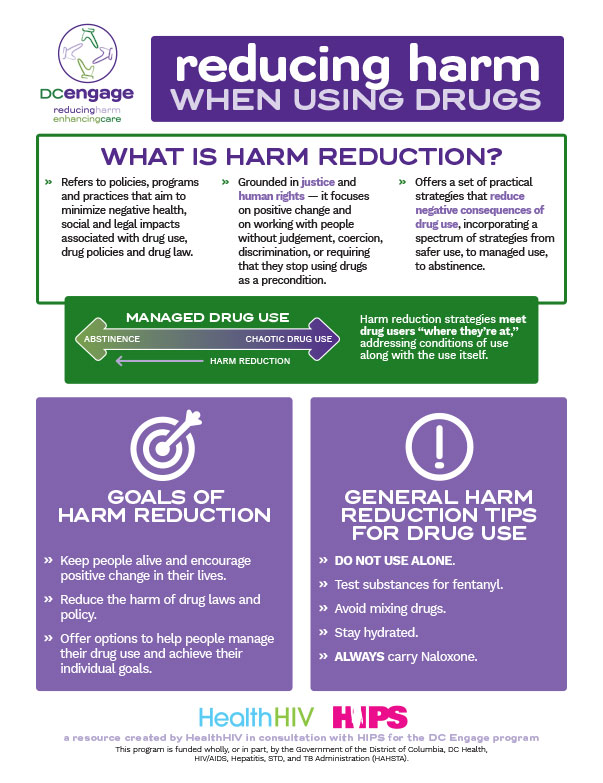Resources
These comprehensive and diverse resources cover a wide range of Harm Reduction topics, from addiction treatment to overdose prevention. The library contains resources, tools, and information on services for both healthcare providers and the community.
Latest Resource
-
Community Mapping and Identifying Priority Populations for HIV Prevention and Care
This 2023 Community Mapping Toolkit for D.C. Organizations details how visualizing health disparities can help outreach programs for HIV prevention. The toolkit explores how community mapping can support your work, what goes into creating a community map, and how to use mapping tools that are available online.
Featured Resource

Reducing Harm When Using Drugs
This downloadable PDF provides general harm reduction tips for drug use and information on local harm reduction organizations in the Washington, DC area.
Resource Library
Filter Resources
Opioid death rates soared in communities where pain pills flowed
Death rates from opioids soared in the towns, cities and counties that were saturated with billions of prescription pain pills from 2006 through 2012, according to government death data and a previously undisclosed database of opioid shipments.
Opioid Risk Tool (ORT)
The Opioid Risk Tool (ORT) is a brief, self-report screening tool designed for use with adult patients in primary care settings to assess the risk for opioid abuse among individuals prescribed opioids for the treatment of chronic pain.
PCSS Overview of Medications for Addiction Treatment
Medications for Addiction Treatment (MAT) of Substance Use Disorders involve a combination of medications that target the brain and psychosocial interventions (e.g., counseling, skills development) aimed at improving treatment outcomes.
PCSS Resources for Health Professionals, Patients and Community
These resources for treating OUD and chronic pain were developed for health professionals, patients, family members and significant others of patients and the general community to learn more about the evidence-based treatment of opioid use disorders and the treatment of chronic pain.
PEG13: A Three-Item Scale Assessing Pain
Development and Initial Validation of the PEG, a Three-item Scale Assessing Pain Intensity and Interference
Pharmacy-Based Naloxone Access
Delivery-based Naloxone Access: Can’t come to a pharmacy to pick up naloxone? Text “LiveLongDC” to 888-811 to request delivery.
Project Lazarus and Community of Care North Carolina Pain Management Toolkits
Project Lazarus and Community Care of North Carolina developed the Chronic Pain Initiative toolkits below to provide best practices and protocols for Primary Care Providers and Emergency Departments.
Provider’s Clinical Support System for Medication-Assisted Treatment
PCSS is a program funded by the Substance Abuse and Mental Health Services Administration (SAMHSA) created in response to the opioid overdose epidemic to train primary care providers in the evidence-based prevention and treatment of opioid use disorders (OUD) and treatment of chronic pain.
Reducing Harm When Using Drugs
This resource provides general harm reduction tips for drug use and information on local harm reduction organizations.
Resource Guide for Washington, DC Organizations
This resource guide lists organizations in Washington, DC that offer assistance in areas including housing, harm reduction, safer sex and STI testing, food, clothing, legal, health care, and social support.
SAMHSA National Mental Health Information Center
The Substance Abuse and Mental Health Services Administration (SAMHSA) is the agency within the U.S. Department of Health and Human Services that leads public health efforts to advance the behavioral health of the nation. SAMHSA’s mission is to reduce the impact of substance abuse and mental illness on America’s communities.
SAMHSA’s Medication-Assisted Treatment for Substance Use Disorders Opioid Treatment Program Directory
Select a state and find all of the contact information of the opioid treatment centers located within the selected state.
